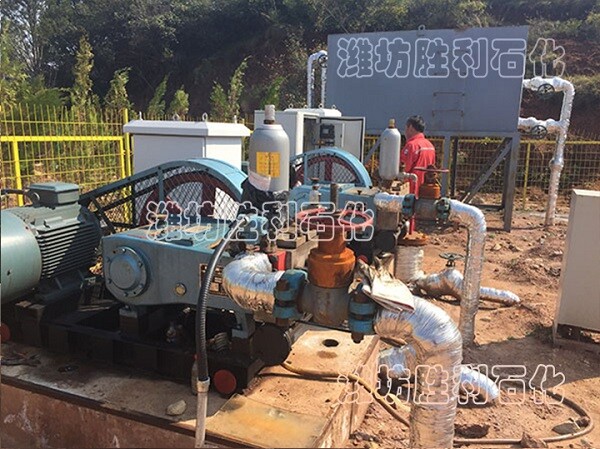
The Hidden Benefits of Polymer Pumps You Didn't Know About
Discover the untapped advantages of polymer pumps that go beyond standard fluid transfer applications. As industry-leading solutions for petroleum, chemical, and energy sectors, polymer injection pumps offer remarkable efficiency, durability, and versatility that even experienced operators often overlook. Whether you're evaluating mud pumps for drilling operations or high-pressure pumps for precise injection systems, this guide reveals critical performance benefits that can transform your equipment selection process.
1. Beyond Basic Fluid Transfer: Advanced Capabilities of Polymer Pumps
Polymer pumps, particularly those designed for high-pressure injection systems, deliver far more value than simple fluid movement. These precision-engineered machines excel in handling viscous polymers with minimal shear degradation, maintaining molecular integrity critical for enhanced oil recovery (EOR) operations. Unlike conventional mud pumps that merely move fluids, polymer injection pumps incorporate specialized features like progressive cavity designs and hardened alloy components that withstand abrasive mixtures common in shale gas extraction. The latest models from leading manufacturers like Weifang Shengli Petrochemical Machinery integrate smart monitoring systems that track viscosity changes in real-time, automatically adjusting flow rates to maintain optimal injection parameters. For technical evaluators comparing pump specifications, consider how polymer-specific designs reduce energy consumption by up to 35% compared to retrofitted centrifugal pumps when handling non-Newtonian fluids.
2. Industry-Specific Advantages: Where Polymer Pumps Outperform
In coalbed methane extraction, specialized polymer pump configurations prevent gas lock while maintaining steady flow rates under fluctuating backpressures—a common challenge where standard injection pumps fail. The multiphase pumping capability allows simultaneous handling of entrained gases without sacrificing polymer dosing accuracy. For municipal water treatment plants, NSF-approved polymer dosing pumps provide exact flocculant delivery at flow rates adjustable from 1:1000 turndown ratios, eliminating the need for multiple pump stations. Decision-makers should note how these application-specific designs reduce total cost of ownership through reduced maintenance intervals and extended seal life, with some models achieving 25,000+ hours between overhauls in continuous service.
3. Technical Deep Dive: Engineering Innovations in Modern Polymer Pumps
Contemporary high-pressure polymer pumps incorporate several underappreciated technological advancements. The hydraulic end designs now feature patented pulsation dampeners that reduce pressure fluctuations to <1% ripple—critical for sensitive polymer chains used in fracking fluids. Compared to first-generation mud pumps still common in many fields, these third-generation systems utilize computational fluid dynamics (CFD)-optimized flow paths that minimize viscous heating, preserving polymer molecular weight above 95% retention even at 7,500 psi discharge pressures. For operations personnel, the maintenance advantages are substantial: quick-change cartridge seals replace traditional packed designs, reducing seal replacement time from 8 hours to under 45 minutes. The graph below illustrates the performance gap between legacy and advanced polymer pump technologies in key operational parameters.
4. Cost Analysis & Operational Considerations
While polymer injection pumps carry 15-20% higher upfront costs compared to conventional high-pressure pumps, their lifecycle economics reveal compelling advantages. A detailed breakdown shows:
- Energy Savings: 22-28% lower power consumption from optimized hydraulics
- Reduced Downtime: 60% fewer unplanned shutdowns versus repurposed mud pumps
- Chemical Efficiency: 8-12% less polymer usage through precise metering
- Maintenance Costs: $18,000/year savings on average from extended component life
Field studies in Permian Basin oilfields demonstrate 9-month ROI periods when upgrading to purpose-built polymer pumps from adapted cement pumps. The operational data reveals unexpected benefits like reduced wellhead equipment wear due to stabilized injection pressures, plus the ability to handle unexpected solids content up to 3% without pump damage—a frequent issue in mature fields where traditional injection pumps require upstream filtration systems.
5. FAQ: Addressing Common Polymer Pump Misconceptions
Q: Can't we just use our existing mud pumps for polymer injection?
A: While possible, retrofitted mud pumps typically degrade polymer effectiveness by 30-40% due to excessive shear and inconsistent flow rates. Purpose-built polymer injection pumps maintain molecular integrity while providing precise control unavailable in standard designs.
Q: Are polymer pumps suitable for high-temperature applications?
A: Advanced models with ceramic-lined fluid ends and high-temp seals reliably operate at 180°C (356°F), making them ideal for SAGD (steam-assisted gravity drainage) operations where conventional pumps fail.
Q: How do polymer pump maintenance requirements compare to traditional pumps?
A: Modern designs actually reduce maintenance through features like:self-lubricating wear parts, seal-less magnetic drive options, and predictive monitoring systems that alert technicians before issues arise.
Why Choose Weifang Shengli Petrochemical Machinery?
With over two decades specializing in high-pressure pumping solutions, our polymer injection pumps incorporate field-proven innovations from thousands of installations worldwide. Unlike generic pump suppliers, we engineer each component—from metallurgy to control systems—specifically for polymer handling challenges. Our ISO 9001-certified manufacturing ensures every pump delivers the precision and reliability demanded by today's most challenging applications. Contact our engineering team today for a customized solution analysis tailored to your operational requirements and fluid characteristics.
